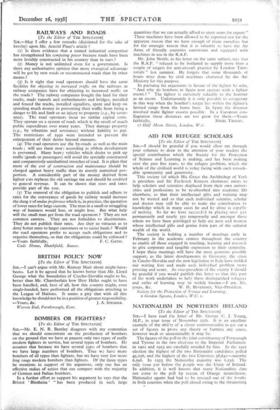- RAILWAYS AND ROADS .
[To the Editor of THE SPECTATOR]
SIR,—May I offer a few remarks (disjointed for the sake of brevity) upon Mr. Arnold Plant's article ?
(r) Is there evidence that a named industrial competitor has strengthened his competing power because roads have been more lavishly constructed in his country than in ours ?
(2) Money is not unlimited even for a government. Is there any authoritative opinion that more strategical advantage Will be got by new roads or reconstructed roads than by other means ?
(3) Is it right that road operators should have the same
facilities for objecting to increased traffic on the railways as railway companies have for objecting to increased traffic on the roads ? The railway companies bought the land for their tracks, made tunnels and embankments and bridges, metalled and fenced the tracks, installed signallers, spent and keep on spending much money in preventing their traffic from being a danger to life and limb or an injury to property (e.g., by sever- ance). The road operators incur no similar capital costs. They operate on a system of roads which is the result of much public expenditure over many years. They damage property (e.g., by vibration and severance) without liability to pay. The restrictions of 1930 were intended to prevent the enlargement of their desire beyond measure.
(4) The road operators use the by-roads as well as the main
roads ; will use them mor: according as ribbon development is prevented. Many heav j vehicles which desire to pick up traffic (goods or passengers) will avoid the specially constructed and comparatively uninhabited stretches of road. It is plain that more of the cost of construction and maintenance should be charged against heavy traffic than its merely numerical pro- portion. A considerable part of the money derived from lighter cars replaces the old carriage tax and should be credited to general revenue. It can be shown that rates and taxes provide part of the cost.
(5) The removal of the obligation to publish and adhere to
rates for the conveyance of goods by railway would increase the danger of undue preference which is, in practice, the quotation of lower rates for large custom. The man in a small or struggling way of business would lose, or might lose. But what help will the small man get from the road operators ? They are not common carriers. They are not forbidden to discriminate. They do not publish their rates. Are they so virtuous as to deny better rates to larger customers or to easier hauls ? Would the road operators prefer to accept such obligations and to organise themselves, so that the obligations could be enforced ?
—Yours faithfully, F. C. GATES. Cade House, Heathfield, Sussex.














































 Previous page
Previous page